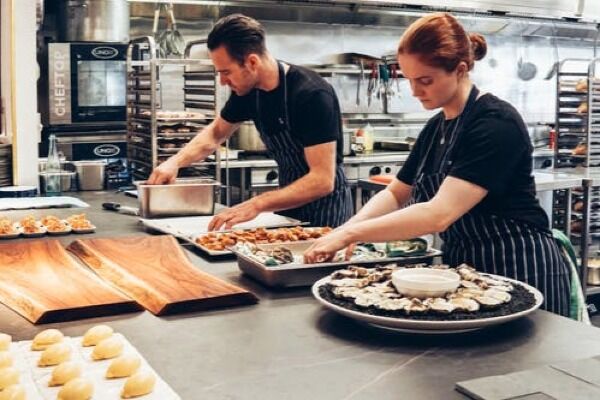Find out how much to charge for cooking classes, the factors affecting the pricing of online cooking classes and set a competitive price for your lessons.
So, you have finally made up your mind to start that cooking class, yay!
If you love to be in the apron and a kitchen is a magical place for you, you might just be having quite an experience!
This doesn’t mean any bumpy rides, but more opportunities to branch out and explore new horizons.
It’s great to be a cooking expert and have the best recipes and mixtures.
But if you are not getting paid for it, soon, you won’t have any zeal left to continue.
Plus, bills are always calling.
It’s not always easy to decide how much you should charge for your cooking classes.
After all, you don’t want to go too high that students can’t book your classes or go too low because you need to make a decent profit.
So, how much should you charge for your cooking classes?
Well, that depends on a couple of things.
We wrote this article to guide you through your pricing, so in case you are wondering, “How much do I charge for my cooking classes?” this is for you!
So, let’s begin.
Table of Contents:
How much to charge for cooking classes:
The Average Cost Of A Cooking Class

This is the number one thing you want to figure out when you are trying to decide on what or how much to charge for your cooking classes.
It would hardly be wise to go set your prices at whatever range you want to, just because you feel you can do so.
You will need to make reference to other cooking coaches in your industry and find their price ranges for each type of class and more.
Sort of like a template for prices.
As we mentioned already, in this article, we will be sharing some factors to consider while charging for your cooking classes, but before we get to that, let’s finish this up first.
While some chefs and cooking instructors may require a minimum charge for their time and efforts, others may not have a particular limit.
Take LK Culinary for instance who asks for these minimums:
- Weekday group cooking lessons: $600
- Weekend group cooking Lessons: $1000
Just in case you’re wondering why it works that way, weekends usually have higher demands for a cooking instructor’s services, and this would mean increased charges for lessons on Saturdays and Sundays, and back to lower costs for weekdays.
The cost of cooking classes generally ranges from $25 to $100/hr.
In some places, the average cost for cooking classes is $45 per hour.
It’s important to note that these variations can be influenced by region, but the average ranges between $25 to $100 an hour.
When fixing the prices for your online cooking classes, you want to pitch your tent somewhere in-between this range.
You don’t want your students running off to others who have done their industry research and market findings better than you.
What to Consider When Charging for Cooking Classes
Just before you start your pricing, there are a couple of things you should consider, and we have named about eight things to consider when charging for cooking classes.
1. The Type Of Lessons You Offer i.e. Group, Children, Or Private Lessons?

Your pricing is also largely defined or determined by the type of lessons you are offering.
Are you teaching a group or are you training children?
Is it a private lesson?
Some chefs go for children’s cookery classes and teach children or teens either on location or for summer camps.
Some even travel around teaching cooking.
Whatever works for you is what you should go for.
You can also consider private coaching, where you have one-on-one sessions with people and they pay you extra for the exclusivity.
What we’re simply saying is that the type of lessons you offer will determine the price you charge for your cooking classes.
2. The Size Of The Class

Cooking trainers often charge per person for their cooking classes, with varying rates depending on what’s being taught.
Usually, a per person charge covers the cost of the ingredients for each participant.
It depends on the number of people attending your class.
Many trainers usually go with the cost per head payment to include fees and everything associated with the activity, but it generally depends on how many people are in the class.
A larger number may mean lesser fees individually, depending on your preference.
3. Time Taken To Prepare The Lessons

You also want to take into consideration the time it took you to prepare for the class.
This can influence your pricing justifiably.
For instance, a class requires you to create exercises or do research, you can charge a little higher than what you would if you were just arriving in the classroom without the need for preparation.
But we don’t think this is a good idea, every teacher has to have some level of preparation.
Moreover, the better prepared your course, the higher the quality, and the more you can charge.
Note that the preparation time depends on the teacher as well as the investments required; it also depends on the topic and the level you are handling.
Some topics require less work than others.
4. Cooking Ingredients
This is a very major determinant or factor involved in your pricing.
The price of the ingredients comes almost first.
The price of the ingredients affects the cost of the cooking lessons you offer.
So you want your students to know that in addition to paying for their teacher’s time, they are also paying for the cost of the ingredients.
The reality is this: the fancier the cuisine, the more you will charge for the cooking class.
For instance, brunch workshops may go for a fee lesser than steak with several sides.
And a class for a variety of sushi will go higher than a steak class.
5. Duration

Another major factor that determines your prices for your cooking classes is the length of the tuition itself.
For instance, a 7-day course would not cost more than a term-long course.
In the same way, you would expect a week-long course to cost significantly more than a half-day course.
The same thing applies to hourly courses.
The duration of the course determines your pricing to a great extent.
6. Your Qualifications

This is where you take in what level you are operating on.
You definitely would expect a university lecturer to get paid more than a high-school teacher.
What’s the difference?
Their qualifications!
Your students will perceive your value and that of your cooking course according to the level of your qualifications.
You might want to get one or two certifications up your sleeves.
This is not to say, however, that you should let your humble beginning keep you from striking out.
Everyone has to start somewhere.
As the saying goes, you don’t have to be great to start, but you have to start to be great.
If it’s your first time, try to set a realistic price and be open enough to let your students know what you can handle, while at the same time giving room for improvement and growth.
But keep it in mind, however, that your qualification is a key factor in determining the prices of your cooking classes.
7. Experience

This factor goes alongside the previous one.
The price of your cooking lessons will vary depending also on your level of experience.
You need a level of experience for whatever field you decide to stay in.
This criterion alone has a major influence on your income as a chef or cooking trainer.
Understand that your experience reassures the students who are investing their money in your classes.
It sets their mind at ease to know that they are in good hands.
The more your experience, the more trustworthy your students deem you, and of course, the more your account will smile.
We don’t mean of course that you need so many years of experience as a teacher.
But be sure you have enough to get started and stay ahead.
The fact remains that when it comes to your earning as a trainer, your experience is a non-negotiable plus.
A famous chef who has worked internationally in the best and topmost dining restaurants will charge higher fees than a chef working in a pub.
This is not to say that you can’t charge what you know you deserve, all things being equal, but that you have to keep it in mind that your experience will go a long way in determining the prices you set on your cooking classes.
8. Location

Maybe you’re like many chefs who are willing to go just about anywhere as far as there are is a counter and an oven plus the right ingredients.
And of course, at the right price.
We think though, that it is best to have your cooking classes at professional kitchens, or at least, something standard and comfortable.
It doesn’t mean you can’t be creative and innovative about the environment you choose to teach your cooking classes in.
Just keep it in mind that cooking trainers will charge differently depending also on the locations they have to use.
If a professional kitchen would cost more which of course is usual, then you want to consider your cost too when fixing your price.
Conclusion
These are the major factors you should keep in mind as you consider what price you should charge for your cooking classes.
Taking stock of all these determinants saves you time, energy, and money.
Remember also, that the average prices applied to your region may not hold sway other parts, so keep that in mind if you intend to move.
Just try to stay within the average range.
Also, carry out your research if you need to narrow down on your niche and scan the international market to see how things work in your industry.
This will enable you to position yourself well and take advantage of the numerous opportunities that are available for cooking instructors.
We hope you found this article helpful!
You May Also Like
6 Reasons Why Vloggers Should Teach Online Classes
How to Conduct Classes For Online Teaching
8 Reasons Why You Should Create Live Online Classes
11 Reasons Bloggers Should Teach Online Classes
Top 10 Online Classes Principles & Best Practices
Sell Online Classes: How To Sell Your Online Classes
Anita is a part of Weshare’s writing team. She has social media marketing experience for over 4 years and has been writing in-depth guides and articles about marketing, social media, and online education for the past 7 years.
We Also Reviewed
- 45+ Advertising Statistics That Will Blow Your Mind
- 33 CRM Statistics You Should Know
- 41+ Public Speaking Statistics You Should Know
- 35 Machine Learning Statistics You Should Know
- 34 Employee Burnout Statistics You Should Know
- 39+ Communication Statistics You Need To Know
- 37+ Cold Calling Statistics You Need To Know
- 21+ Entrepreneur Statistics You Should Know
- 35+ Contract Management Statistics You Should Know
- 37+ Zoom Statistics You Should Know
- 35+ Sales Training Statistics You Should Know About
- 75+ WordPress Statistics You Need to Know
- 41+ Startup Statistics You Need to Know
- 37+ Presentation Statistics You Need To Know
- 41+ Recruiting Statistics You Need to Know
- 23+ Apple Podcast Statistics You Should Know About
- 31+ Spotify Podcast Statistics You Should Know About
- 35+ Spotify Statistics You Should Know
